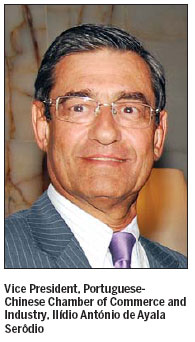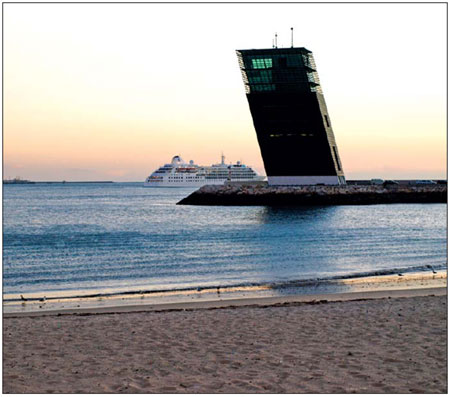China-Europe
Iberian hub is China's bridge to the world
Updated: 2011-06-28 08:20
(China Daily)
|
The maritime control tower, Lisbon. Provided to China Daily |

Warm Sino-Portuguese bilateral relations show renewed vigor for exchange and partnership
A beautiful country situated on the farthest corner of southwest Europe, Portugal is one of the continent's oldest states.
Enjoying 1,793 kilometers of coastline on both the Atlantic and the Mediterranean, and a temperate climate, the country is best-known for its superb tourism, excellent hospitality, food, wine and quality of life. And, with the paradise islands of Madeira and the Azores, two thriving cities - Lisbon, the capital, and Porto - and the beach strip of the Algarve, Portugal has long celebrated a niche among sun-seekers looking for a place to live or stay.
What is not perhaps so well known is the country's innovative prowess in the areas of energy, finance, technology and industry and the wealth of expertise that exists among its 10.7 million population.
Portugal has become a diversified, primarily service-based economy since it joined the European Community - the EU's predecessor-in 1986, with key areas of the economy now privatized.
It qualified for the Economic and Monetary Union (EMU) in 1998 and began circulating the euro on January 1, 2002.
Although the economy grew by more than the EU average for much of the 1990s, it fell back between 2001-2008, and contracted 2.6 percent in 2009, before growing 1 percent in 2010.
Gross domestic product per capita now stands at roughly two-thirds of the EU-27 average.
Strategic advantages
Because of its location, Portugal is ideal for those looking to supply European markets or expand their businesses to other parts of the world, thanks to state of the art logistical and communications infrastructures.
As well as excellent connections to major cities by air, land, sea, road and rail, Portugal also offers some of the most advanced telecommunications in the world.
The country's highly skilled and talented workforce is also attractive for businesses choosing to set up there, with the universities and colleges providing a healthy supply of trained professionals and vocational workers every year.
Portugal is an innovative country with an enabling economic environment.
A wide range of services are available to investors online and through chambers of commerce and investment agencies, with professionals and business tools available to advise on the best location for particular projects.
Current priorities
After attempting to implement a series of austerity measures in January this year to reduce the budget deficit from 9.3 percent of GDP in 2009 to 4.6 percent in 2011, which included a 5 percent salary cut in the public sector, and a 2 percent increase in VAT (value added tax), the government was forced to ask for financial aid from the European Union and the International Monetary Fund.
Jos Scrates stood down as prime minister on March 23, and ratings agency Fitch has estimated Portugal needs 60 billion euro ($85 billion) in funding to stay afloat through to the end of 2013.
In the meantime, the government, led by President Anbal Cavaco Silva, has prioritized boosting exports primarily in automotive industry equipment, machinery, minerals, fuels, metals, chemicals, plastic and rubber, and implementing labor market reforms in order to raise growth and increase Portugal's competitiveness in Europe and beyond.
Historic ties with China
With a strategic world location, Portugal is superbly placed for investors needing a platform from which to do business with Europe, Africa and the Americas.
Its links with the Portuguese-speaking (Lusophone) countries of Angola, Brazil, Mozambique, East Timor, Cape Verde, Principe Tome and China's Macao special administrative region offer particular benefits for Chinese investors wishing to have a presence in Africa, Asia and South America.
The Portuguese have enjoyed a long and fruitful relationship with Asia. Indeed, as the first Europeans to establish a presence and start commercial and diplomatic relations in the territories that today correspond to India, Sri Lanka, Thailand, Malaysia and Japan, it is sill possible to find descendents in those areas with Portuguese surnames.

Portugal's relations with China began in 1513 in Macao, which was a key city for trading with Japan and for silver, gold and silk route traffic.
Macao continued to be a contact point between China and Portugal, before it was returned to Chinese sovereignty in 1999.
Building on these five centuries of familiarity and cooperation is therefore beneficial for both China and Portugal, as the Asian giant expands its industrial activity and enters new markets, especially the Lusophone African countries.
In addition, Portugal holds unique skills in the fields of health management, infrastructure construction -particularly dams, railways and hospitals - and hotel management and tourism, all of which can help China as it expands its reach and opens itself up to the rest of the world.
Celebrating this common past and establishing partnerships for the future is a winning strategy that pundits believe will guarantee a further five hundred years of successful relations for China and Portugal.
Official visit bears fruit
Portugal's trading relationship with China was officially cemented in 2005, when the countries signed a trade and cooperation agreement, and strengthened again in November last year, when China's President Hu Jintao made an official visit to Lisbon.
Speaking at a meeting with Portuguese President Anbal Cavaco Silva, President Hu Jintao announced that China and Portugual need to make efforts to boost their strategic partnership to better benefit their peoples.
The Chinese President outlined a four point proposal that called on the two sides to strengthen mutual political trust and strategic cooperation by bolstering high-level exchanges and broadening communication between governments, legislatures, and political parties of the two groups.
He also called on the two countries to step up people exchanges and double bilateral trade by 2015. President Silva, for his part, agreed with Hu's proposals, calling for the establishment of a comprehensive strategic partnership between the two countries in 2005 "a milestone in China-Portugal relations," adding that he wished both sides to further achieve the potential to enhance trade and investment with each other, and expand pragmatic cooperation in various fields.
President Silva also paid tribute to China's impressive economic development and praised its successful hosting of the Shanghai Expo.
Speaking shortly after the visit, caretaker Prime Minister Jos Scrates said: "This visit was positive on two levels: it will increase Chinese investment in Portugal and also increase our business relationship in several areas in which we are competitive: port infrastructure, information and communications technology (ICT), tourism, industrial and banking sectors. "We have signed cooperation agreements that will certainly bear fruit.
"But the most interesting thing we found was that China's relationship with Portugal would radiate throughout the world: in the European Union, and in the Portuguese-speaking countries in South America, Africa and Asia."
Using its platform as intermediary, the Portuguese government appointed a forum in 2003 in Macao to develop trade policies between Portuguese-speaking countries. The agreements signed between Portugal and China are good evidence of the will of the Chinese to trust in Portugal's economic development."
Leader in e-government
As the EU's leader in e-government, Portugal has proven the maturity of its technological prowess.
It exports more technology than it imports and is one of the fastest countries in the world in which to buy a house and register a business: its Empresa na Hora, or "Company in one hour" initiative has made it extremely competitive in terms of business friendliness.
These factors alone make Portugal an attractive prospect in view of its business environment and the modernization of a business sector that wants to compete in sophisticated global economic activity.
The Macao Forum
The countries also share a link through Macao, which has maintained certain elements of its European heritage, including the Portuguese language.
Macao has traditionally played a relevant role for the approach of the Portuguese and Chinese business community. Since 1992, the Portuguese-Chinese Chamber of Commerce and Industry (CCIL-C) has had a branch office in the territory and signed several collaborations agreements, including the Macau Trade and Investment Promotion Institute (IPIM), Macau Chamber of Commerce, World Trade Center and the Macau Young Entrepreneur Association.
The Macao special administrative region (SAR) government supports and encourages the CCIL-C delegation to play a leading role in sustaining a network of Portuguese interests in the SAR and the Chinese mainland.
Following a ministerial meeting between China and the Lusophone countries held in Macao last November, Manuel Amante da Rosa, deputy secretary-general of the Permanent Secretariat of the Forum for Economic and Trade Cooperation between China and Portuguese-Speaking Countries (known as the "Macao Forum"), observed that the new agreement would have "a wider scope".
Media, culture and the financial sector are the new areas in which China and the Portuguese-speaking countries will attempt to cooperate during the next three years.
Chamber of commerce
The Portuguese-Chinese Chamber of Commerce and Industry has been instrumental in building trade relationships between Portuguese companies and China, providing its associates contacts and relationships and strategic consulting to strengthen trade relations.
To implement this, CCIL-C has formed institutional relations in China with the China Council for the Promotion of International Trade, All-China Federation of Industries and Commerce, Chinamex, IPIM, Macao Forum, and has signed several cooperation agreements with many other Chinese official institutions.
Ildio Antnio de Ayala Serdio, vice president of CCIL-C, notes how members are spread across all sectors, including power, contractors, engineering/environment consultants, banks/financial institutions, airlines and investment companies, to name a few.
"Portuguese imports from China reached $1.65 billion compared with exports which reached $483.5 million," he said. "Trading between China and the Lusophone countries accelerated 50 percent in the first 11 months of 2010, over the same period in 2009, totalling $8.9 billion."
In 2010, Portugal's import and export figures to China showed an increase of 32.4 percent and 60.7 percent respectively. By November 2010, trade between the two countries amounted to $2.9 billion, 38 percent more than in the same period in 2009.
E-paper

Pearl paradise
Dreams of a 'crazy' man turned out to be a real pearler for city
Literary beacon
Venice of china
Up to the mark
Specials

Power of profit
Western companies can learn from management practices of firms in emerging economies

Foreign-friendly skies
About a year ago, 48-year-old Roy Weinberg gave up his job with US Airways, moved to Shanghai and became a captain for China's Spring Airlines.

Plows, tough guys and real men
在这个时代,怎样才"够男人"? On the character "Man"

